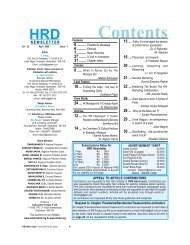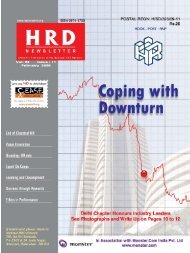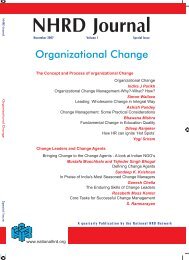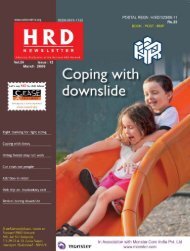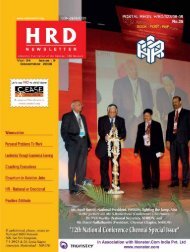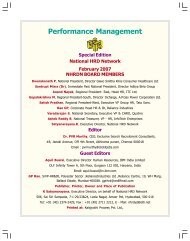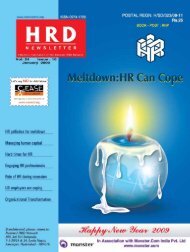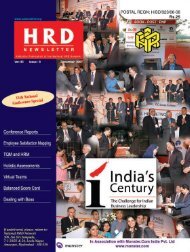New Year Resolutions of a Manager - National HRD Network
New Year Resolutions of a Manager - National HRD Network
New Year Resolutions of a Manager - National HRD Network
Create successful ePaper yourself
Turn your PDF publications into a flip-book with our unique Google optimized e-Paper software.
Outstanding Leaders:<br />
The Need <strong>of</strong> the Hour<br />
Your life shouldn't end up with being a leader;<br />
it should begin with it."<br />
Executive Summary:<br />
Emphasis on management has created an<br />
impression that leadership has perhaps no<br />
role to play in industry. Traditional mind<br />
associates leadership with the military and<br />
political models and finds it irrelevant to the<br />
industrial or business world. Nothing can be<br />
far from reality than this notion.<br />
Management, with all its refinements still<br />
remains only a tool and never can be a<br />
substitute for leadership. People, the most<br />
valuable resource <strong>of</strong> any organization, can<br />
only be "led" in to giving <strong>of</strong> their best. They<br />
cannot be managed into such performances.<br />
On the other side <strong>of</strong> the coin, today the<br />
organization needs what they preach.<br />
Whatever the leaders and best ones in<br />
society do, the commoners follow. This is<br />
the kind <strong>of</strong> leadership advocated throughout<br />
in the scriptures. The visionary leader must<br />
also be a missionary, extremely practical,<br />
intensively dynamic and capable <strong>of</strong><br />
translating dreams <strong>of</strong> the organization into<br />
reality. This article is the quintessence <strong>of</strong><br />
leadership and provides an opportunity to<br />
chew the euphoria <strong>of</strong> becoming an effective<br />
leader and unravel one's innate qualities.<br />
Elucidation:<br />
In every human activity a leader is needed<br />
to guide. A head <strong>of</strong> a family is the most<br />
common leader. On the quality <strong>of</strong> the leader,<br />
depends the progress, happiness and<br />
fortunes <strong>of</strong> the family.<br />
In all walks <strong>of</strong> life, be it in the schools,<br />
colleges, factories, in public life, a leader is<br />
a must. If these leaders are good, then they<br />
promote unity, harmony, strength, prosperity<br />
and happiness in society.<br />
* Eminent Contributions:<br />
Several definitions have been put forward<br />
for leadership. In essence, however, these<br />
all agree that leadership is the activity <strong>of</strong><br />
influencing people to strive willingly for group<br />
objectives. There is one more general<br />
agreement that Leaders are not necessarily<br />
born, they can be trained.<br />
Several studies have contributed to the<br />
contemporary knowledge on the<br />
dynamics <strong>of</strong> leadership. More<br />
noteworthy among these have been:<br />
a) Hawthorn studies which concluded that<br />
productivity was more a function <strong>of</strong><br />
attitude <strong>of</strong> workers towards each other<br />
and the attention they received from the<br />
management rather than any facilities<br />
that the management may provide to<br />
improve their working conditions per se.<br />
b) Michigan Studies which identified<br />
leadership styles on the basis <strong>of</strong> leader<br />
orientation i.e. Employee Oriented and<br />
Production Oriented emphasizing the<br />
need for balancing the two to obtain<br />
optimum results.<br />
Each <strong>of</strong> these studies has made useful<br />
contribution to the understanding <strong>of</strong> the<br />
phenomenon <strong>of</strong> Leadership. It is however<br />
no exaggeration to suggest that the<br />
phenomenon remains less than fully<br />
understood even till date.<br />
And right now, we hope readers would agree<br />
with us that the success or failure <strong>of</strong> any<br />
organization, company or institution, interalia,<br />
depends on the kind <strong>of</strong> a leader it has.<br />
* Emergence <strong>of</strong> Authority:<br />
The authority base <strong>of</strong> a Leader varies<br />
both on account <strong>of</strong> personal and<br />
organizational factors. Basically there<br />
are three different sources <strong>of</strong> authority:<br />
(a) Traditional Authority i.e. the authority<br />
born out <strong>of</strong> one's position in the<br />
organization. It is also known as<br />
legitimate power.<br />
(b) Authority born out <strong>of</strong> functional or<br />
technical expertise such as that <strong>of</strong> a<br />
specialist or an authority on the subject.<br />
It is also called expert power.<br />
(c) Authority derived out <strong>of</strong> skill in managing<br />
people including those pr<strong>of</strong>essionally<br />
more qualified than oneself. This is the<br />
true Leadership Authority.<br />
* Effigy <strong>of</strong> a Leader:<br />
Having accepted that leadership qualities<br />
and abilities can be developed through<br />
diligence, it is necessary to provide a<br />
practical guide to leadership development<br />
processes. Before this, it is necessary for<br />
the potential leader to identify his source <strong>of</strong><br />
authority and then deliberately proceed to<br />
acquire the skills and develop the attributes,<br />
which will fit him for the leadership role,<br />
which he or she aspires. Those who draw<br />
L.K.Jena is faculty at HAL Management Academy, Bangalore. e-mail : lkjena@incindia.org;lalatendu_j@rediffmail.com<br />
L.K.Jena<br />
their authority from pr<strong>of</strong>essional expertise<br />
in their sphere <strong>of</strong> activity, if they persist with<br />
the preoccupation <strong>of</strong> technical excellence<br />
and are not prepared to delegate can at best<br />
and up as highly pr<strong>of</strong>icient managers.<br />
Leadership skills come out <strong>of</strong> his functional<br />
mobility and the ability to hire and utilize man<br />
more able than oneself in order to create<br />
and channelise energy, which after all is the<br />
purpose <strong>of</strong> all leadership.<br />
It is necessary for potential leaders to<br />
develop characteristics <strong>of</strong> behaviour which<br />
are valued most by subordinates. These<br />
include ability to listen, show consideration,<br />
display trustworthiness and constancy as<br />
well as predictability <strong>of</strong> behaviour, tolerance<br />
and inter-personal skills including ability to<br />
communicate effectively.<br />
Leadership bestows authority and brings in<br />
its wake responsibility. A good leader<br />
ensures success by fulfilling his<br />
responsibility fully. "Captain's Innings" is not<br />
unfamiliar to the cricket loving Indian people.<br />
In the business and Industrial environment,<br />
a leader must ensure that:<br />
l Objectives exist and are clear<br />
l Organizational structure is sound and<br />
well understood<br />
l Executive responsibility is backed by<br />
authority<br />
l Conformity is discouraged<br />
l Innovation is promoted<br />
l Information flows freely in the<br />
organization<br />
l Happiness is promoted<br />
l Restrictions minimized<br />
l Praise dispensed where deserved<br />
* Enlighten others….Must be an<br />
unending Journey:<br />
<strong>Manager</strong>s in business both big and small<br />
spend between 60 to 90% <strong>of</strong> their time<br />
dealing with people. Management <strong>of</strong> people<br />
must therefore be their primary concern if<br />
they wish to use this most valuable and<br />
productive resource placed at their disposal,<br />
to its full potential. Leaders must identify their<br />
own behaviour patterns, value judgments and<br />
utilize their identified strengths to weld their<br />
work force into winning teams. They must<br />
create energy through motivation and then<br />
direct it through leadership to produce<br />
excellence in all their endeavors. u H<br />
| <strong>HRD</strong> <strong>New</strong>s Letter | January 2007, Vol.22, Issue:10 27|




